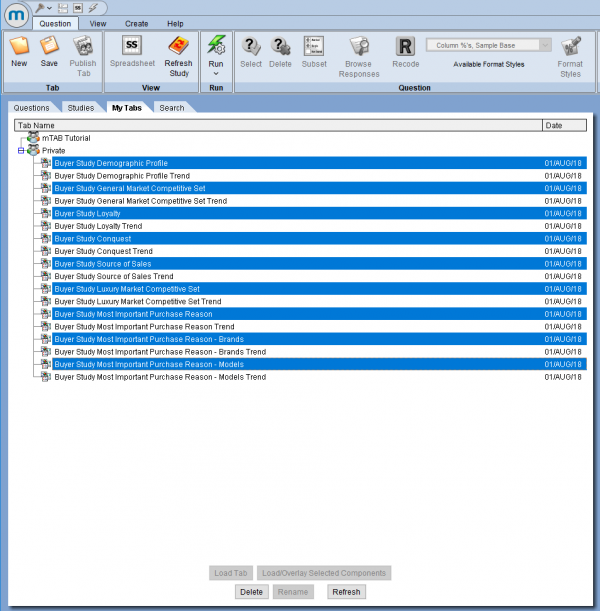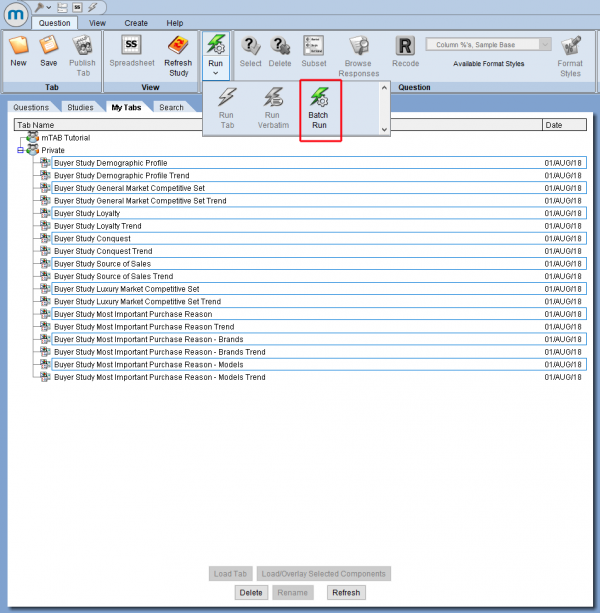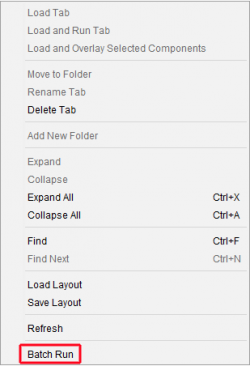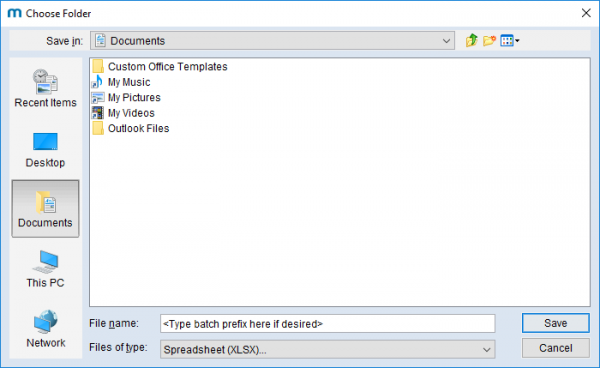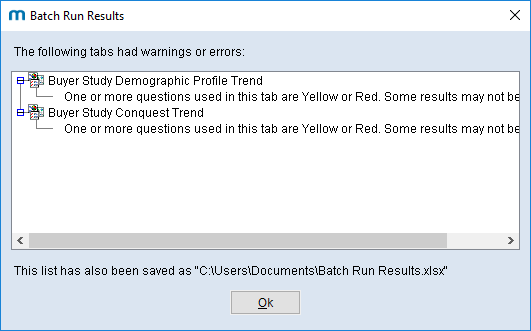Difference between revisions of "Batch Run"
| (6 intermediate revisions by the same user not shown) | |||
| Line 1: | Line 1: | ||
| − | + | The Batch Run feature automates the process of selecting multiple saved tabs, loading and running the data, and exporting the data into spreadsheets. | |
| − | |||
| − | |||
| + | The benefit of Batch Run is that it saves a significant amount of time by eliminating the need to individually load each tab, type a filename for each spreadsheet, and then export one by one. | ||
| − | |||
| + | Batch Run allows users to initiate a very large number of tabs to run and export in the background. This allows users to save time to spend on other tasks. <br />After Batch Run completes, each tab will have been run and the results exported to corresponding spreadsheet files. The most typical format being XLSX. <br />Batch Run supports all spreadsheet file formats that can be exported from mTAB: XLSX, XLS, XML, HTML, CSV, and tab-delimited TXT. | ||
| − | |||
| + | '''How Batch Run Works''' | ||
| − | + | Batch Run starts in the '''My Tabs''' panel, where you will see all of your currently saved tabs listed. | |
| − | ''' | + | [[File:batchrun1.png|600px]] |
| + | |||
| + | Using either [Ctrl-Click] or [Shift-Click] keyboard commands, select all of the Saved Tabs you would like to run. | ||
| + | |||
| + | |||
| + | |||
| + | [[File:batchrun2.png|600px]] | ||
| + | |||
| + | Click on the bottom section of the Run (lightning bolt) icon. <br />You'll see additional Run options. Click the '''Batch Run icon'''. | ||
| + | |||
| + | |||
| + | |||
| + | [[File:batchrun3.png|250px]] | ||
| + | |||
| + | Instead of using the icons, after selecting and highlighting the Saved Tabs, you can also right-click anywhere in the '''My Tabs''' window and a menu will appear. <br />The '''Batch Run''' option will appear at the bottom of the menu. | ||
| − | |||
| − | |||
| − | + | [[File:batchrun4.png|600px]] | |
| − | + | After initiating Batch Run, a Save dialog window will appear. <br />This will allows you to select the folder where the exported files will be saved to. <br />Each spreadsheet file will automatically be given the same name as the Saved Tab, making it easy to identify. | |
| − | |||
| − | |||
| + | Within the same window, there is an option to specify a prefix before the file name of each output file. <br />This allows for the insertion of a common phrase, date, or any other identifying information. <br />Type the optional prefix text into the '''File Name''' box at the '<<Type batch prefix here if desired>>' prompt. | ||
| − | + | Click the '''Save''' button to proceed. | |
| − | + | [[File:batchrun5.png|600px]] | |
| − | + | As the Batch Run process is running, mTAB checks to see if any export issues occur. <br />If so, a dialog will be displayed when the Batch Run process has completed. <br />A detailed issues log is also saved to the same folder as your output files, for future reference. | |
Latest revision as of 19:32, 3 August 2018
The Batch Run feature automates the process of selecting multiple saved tabs, loading and running the data, and exporting the data into spreadsheets.
The benefit of Batch Run is that it saves a significant amount of time by eliminating the need to individually load each tab, type a filename for each spreadsheet, and then export one by one.
Batch Run allows users to initiate a very large number of tabs to run and export in the background. This allows users to save time to spend on other tasks.
After Batch Run completes, each tab will have been run and the results exported to corresponding spreadsheet files. The most typical format being XLSX.
Batch Run supports all spreadsheet file formats that can be exported from mTAB: XLSX, XLS, XML, HTML, CSV, and tab-delimited TXT.
How Batch Run Works
Batch Run starts in the My Tabs panel, where you will see all of your currently saved tabs listed.
Using either [Ctrl-Click] or [Shift-Click] keyboard commands, select all of the Saved Tabs you would like to run.
Click on the bottom section of the Run (lightning bolt) icon.
You'll see additional Run options. Click the Batch Run icon.
Instead of using the icons, after selecting and highlighting the Saved Tabs, you can also right-click anywhere in the My Tabs window and a menu will appear.
The Batch Run option will appear at the bottom of the menu.
After initiating Batch Run, a Save dialog window will appear.
This will allows you to select the folder where the exported files will be saved to.
Each spreadsheet file will automatically be given the same name as the Saved Tab, making it easy to identify.
Within the same window, there is an option to specify a prefix before the file name of each output file.
This allows for the insertion of a common phrase, date, or any other identifying information.
Type the optional prefix text into the File Name box at the '<<Type batch prefix here if desired>>' prompt.
Click the Save button to proceed.
As the Batch Run process is running, mTAB checks to see if any export issues occur.
If so, a dialog will be displayed when the Batch Run process has completed.
A detailed issues log is also saved to the same folder as your output files, for future reference.
